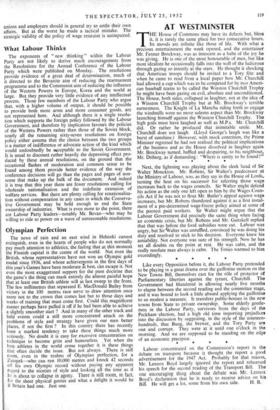AT WESTMINSTER
THE House of Commons may have its defects but, bless it, it is rarely the same place for two consecutive hours. Its moods are infinite like those of life. With what a precious entertainment the week opened, and the entertainer Mr. Fenner Brockway, was as innocent as a babe of the joy he was giving. He is one of the most honourable of men, but like most idealists he occasionally falls into the well of the ludicrous through gazing so intently at the stars. He thought it shocking that American troops should be invited to a Tory fête and when he came to read from a local paper how Mr. Churchill had allowed a cup which was to be competed-for by two Ameri- can baseball teams to be called the Winston Churchill Trophy he might have been gazing on evil, absolute and unconditioned. The House, both sides, collapsed in laughter, not at the idea of a Winston Churchill Trophy but at Mr. Brockway's terrible earnestness. The Knight of La Mancha riding forth to engage the windmills wore no more solemn aspect than Mr. Brockway launching himself against the Winston Churchill Trophy. The high gods must have laughed as well as M.P.s. Mr. Churchill did. Or rather he produced that inimitable smile. Mr. Churchill does not laugh. (Lloyd George's laugh was like a burst of sunshine.) However, with mock contrition, the Prime Minister regretted he had not realised the political implications of the business and as the House dissolved in laughter again Mr. Brockway turned, baffled and despairing, to his neighbour, Mr. Driberg, as if demanding : "Where is sanity to be found?" * * • a Next, the lightning was playing about the sleek head of Sir Walter Monckton. Mr. Robens, Sir Walter's predecessor at the Ministry of Labour, was, as they say in the House of Lords, turning the heat on his successor for referring those wage increases back to the wages councils. Sir Walter might defend his action as the only one left open to him by the Wages Coun- cils Act if he was not to flout Mr. Butler's appeal against wage increases, but Mr. Robens thundered against it as a first instal- ment of a pre-determined wage-freeze policy aimed at some of the poorest paid workers. Sir Walter might argue that the Labour Government did precisely the same thing when facing an economic crisis, but Mr. Robens and Mr. Gaitskell replied that that was before the food subsidies were cut. Labour was angry, but Sir Valter was unruffled, convinced he was doing his duty and resolved to stick to his decision. Everyone knew his amiability. Not everyone was sure of his strength. Now he has set all doubts on the point at rest. He was calm, and the really resolute man always is calm. The Tories warmed to him exceedingly.
* * * a Like every Opposition before it, the Labour Party pretended to be playing in a great drama over the guillotine motion on the New Towns Bill, themselves cast for the role of protector of Parliamentary liberties against the tyrant, Churchill. The Government had blundered in allowing nearly five months to elapse between the second reading and the committee stage, and it was bound to look a little absurd applying the guillotine to so modest a measure. It transfers public-houses in the new towns from State to private ownership., Some elderly gentle- men in the Labour Party, survivors from the days of the Peckham-election, had a high old time importing prejudices into the discussion by suggesting, in the style of the nineteen- hundreds, that Bung, the brewer, and the Tory Party are one and corrupt. They were at it until one o'clock in the morning. And we are supposed to be standing on the edge of an economic precipice.
a * * * Labour concentrated on the Commission's report in the debate on transport because it thought the report a good advertisement for the 1947 Act. Probably for that reason, Mr. Lennox Boyd largely ignored the report and rehearsed his speech for the second reading of the Transport Bill. The one encouraging thing about the debate was Mr. Lennox Boyd's declaration that he is ready to receive advice on his Bill. He will get a lot, some from his own side. H. B.


































 Previous page
Previous page